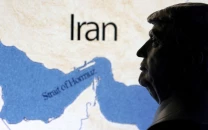Seminar: Nuclear deterrence doctrine has failed to curb wars, say experts
Thakur says 'Responsibility to Protect', a 2005 UN initiative to prevent 'mass atrocity crimes,' humanises diplomacy.

Ramesh Thakur
It is time to rethink the utility of nuclear deterrence in South Asia and a “minimisation strategy” might be a good place to begin anti-nuclear advocacy efforts.
This was stated by Gareth Evans, the former Australian Foreign Minister at a book launch and seminar organised by the Institute of Strategic Studies (ISS) on Thursday. Evans said nuclear weapons are practically “unusable,” both because of the damage they might inflict in combat and the international taboo surrounding their use.

“Nuclear weapons are not deterring conventional attacks so where does the utility really lie?” said Evans, who has served on several international commissions including the 2008-10 Commission on Nuclear Non-proliferation and Disarmament. “It is important in the South Asian context to rethink the extent to which security has really improved by possession of nuclear weapons.”
He said the way forward is to advocate a minimum nuclear deterrence level in nuclear policies. “Let’s get an agreement on no-first-use. Let’s get serious on curbing nuclear deployment,” Evans said. “It is very tough to go to zero (nuclear weapons) but if we can minimise the number of nuclear weapons, that would make the world a lot safer.”
Evans and Ramesh Thakur, director of the Centre for Nuclear Non-proliferation and Disarmament at Melbourne’s Australian National University, were invited by ISS to speak about modern diplomacy to mark the launch of The Oxford Handbook of Modern Diplomacy. The book was missing in action — participants were given forms to pre-order the book from the Oxford University Press instead — but the discussion turned to substantive issues as participants engaged the speakers to talk about nuclear non-proliferation and coercive diplomacy.
Responding to a question about military interventions on humanitarian grounds, Thakur, who has been closely associated with the United Nations (UN) in the past, said “Responsibility to Protect” (R2P), a 2005 UN initiative to prevent “mass atrocity crimes,” humanises diplomacy. Thakur said R2P’s victim-centric view, its focus on prevention and its redefinition of sovereignty not as a right but as a responsibility are some of the ways the initiative puts focus on protecting people in conflict zones.
Evans said the criteria set by the R2P framework for military intervention worked well in the case of Libya. But then, he said, France, United Kingdom and the US — three of the five permanent members of the UN Security Council — “contemptuously” took matters into their own hands and went beyond the protection of civilians to carry out a regime change in Libya.
Evans said a consensus on the R2P has to be recreated in the Security Council and the three permanent members who defied it have to take responsibility.
The two Australia-based experts sounded as only people who have worked long enough to understand intricacies of global diplomacy and the UN system would sound: honest about the system’s shortcomings, somewhat frustrated but defiant in the belief that the struggle to fix global problems must continue.
Earlier, Thakur said the nature of modern diplomacy has changed from the traditional representational diplomacy to include other forms such as shuttle diplomacy, celebrity diplomacy, multilateral efforts and “blue ribbon” commissions.
Evans said a commission could be considered successful if it contributes to building consensus by providing normative outcomes that achieve policy actions or clarify policy agenda. Clarity of objectives, sound leadership, effectiveness consultations, follow-up advocacy, ownership and timing are some of the 10 factors Evans said he thinks contribute to a commission’s success.
Published in The Express Tribune, October 25th, 2013.



















COMMENTS
Comments are moderated and generally will be posted if they are on-topic and not abusive.
For more information, please see our Comments FAQ